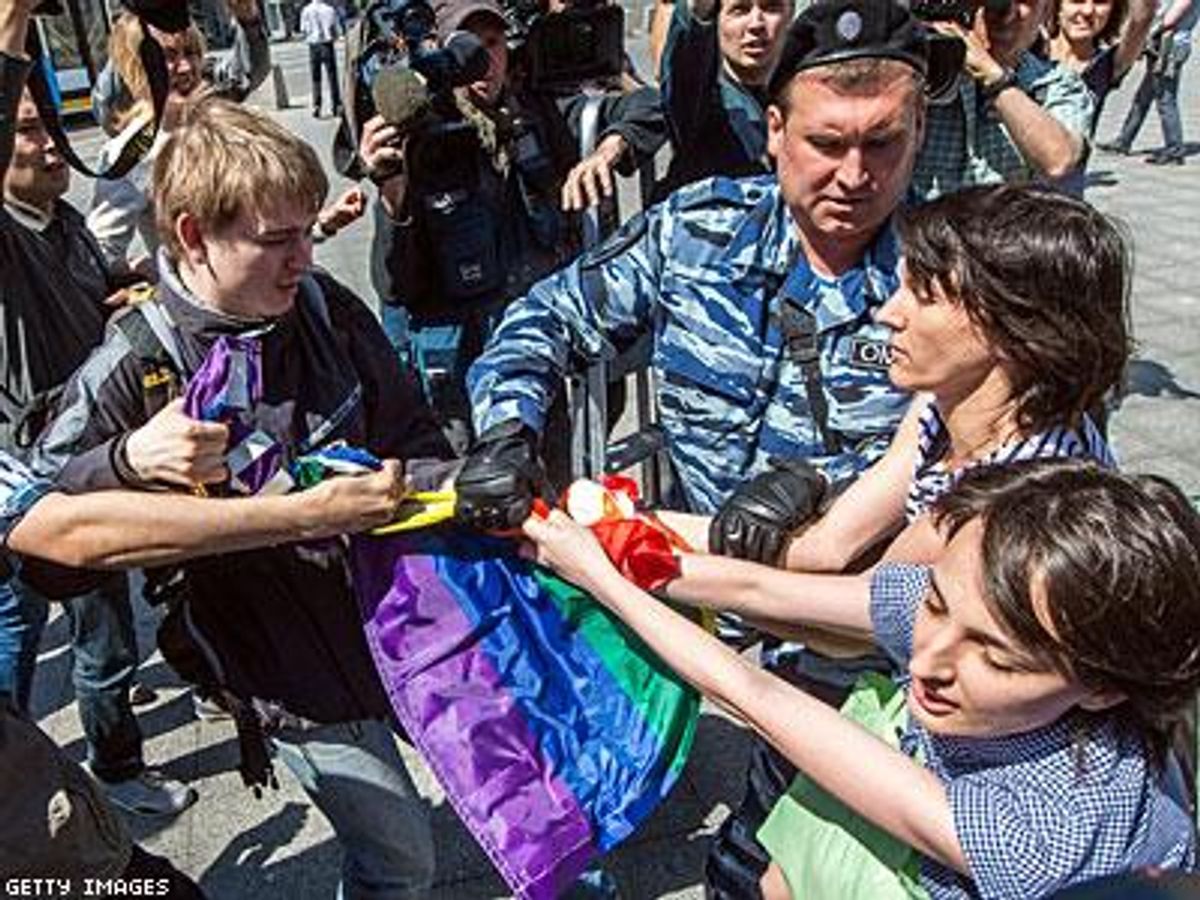The Human Rights Campaign has released a new report on the state of affairs for LGBT people in Russia in advance of the one-year anniversary of that country's draconian nationwide ban on so-called gay propaganda, signed into law June 29 of last year.
The report, titled simply "Russia: Year in Review," catalogs the law's far-reaching impact, with examples of enforcement that range from inane to chilling cases.
Among the more absurd applications of the law are an elementary school that was fined because children there were allowed to exchange Valentine's Day cards with fellow students of the same gender, and a rating of 18+ for a Sims video game that allows characters to be in same-sex couples.
"No violation is too small or silly to escape notice of the anti-LGBT crusaders," the report states. "And targets for investigation have included children's books, a ninth-grade girl, and video games."
The ninth-grade girl the report mentions was investigated by government officials because she told classmates she was a lesbian. Although a media uproar embarrassed Russian officials enough to suspend that investigation, as HRC notes, the teenager continues to live in fear that the inquiry could be relaunched.
A reference sidebar in the form of a (not necessarily sequential) timeline on the report highlights a decade's worth of growing animosity and oppression toward LGBT people in Russia from officials and society in general. However, the report says, societal attitudes take their cues from the official positions of political leaders and those within the powerful Russian Orthodox Church.
The report also notes that even celebrities, such as Madonna and Lady Gaga, both of whom spoke out in Russia against President Vladimir Putin's efforts to marginalize and punish LGBT people, have not been immune from facing investigations and possible fines. In fact, promoters of their concerts were fined for violating Russia's ban on "propaganda of nontraditional sexual relationships."
Despite Putin's promises that the 2014 Winter Olympics in Sochi would not be a dangerous venue for LGBT athletes and spectators, the report documents numerous violations of that promise -- including the arrest of a trans Italian member of parliament who wore rainbow attire.
"Witch hunts, arrests, poisonous gas attacks, and murders," writes Ty Cobb, HRC Foundation's Global Engagement Director of the current atmosphere in Russia. "Not only do these terms evoke powerful memories of brutal regimes that fill the pages of history books, they also represent the very real dangers that LGBT people face each and every day in Vladimir Putin's Russia."
According to Cobb, "The evidence is clear: State-sponsored homophobia and transphobia in Russia poses a direct threat to the safety and welfare of LGBT Russians, and that threat is growing."
But the crackdown may not be over, according to Cobb. HRC's new report on Russia warns that there is even talk of fingerprinting and keeping a database of people with HIV and AIDS who live in the country.
"Some anti-LGBT activists and lawmakers are calling for recriminalizing homosexuality, new laws and constitutional reforms that ban marriage equality, and even a fingerprint database for tracking those with HIV/AIDS," Cobb said in a statement announcing the report.
On Friday, the University of California, Los Angeles, School of Law's Williams Institute announced that it has drafted a declaration supporting Russia's LGBT community and condemning the state-sponsored attacks. Senior public policy scholar Ilan Meyer issued that declaration in support of plaintiffs suing Russia in the European Court of Human Rights, countering Russian claims that the ban on so-called gay propaganda is necessary to protect children from mental illness.
"C]ntrary to the ... [Russian agency's] argument, homosexuals are not at risk of disease because they are homosexual," writes Meyer, who is described as a social epidemiologist. "Rather, risk of disease results from social rejection, stigma, and prejudice related to homophobia. Accordingly, the propaganda law does not advance any legitimate goal in protecting the health of youth because there is no supportable connection between the means (suppressing homosexual propaganda ) and the alleged goals (protecting the health of youth)."


















































































